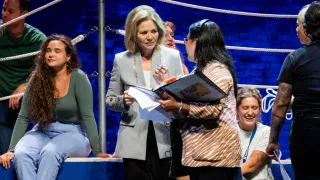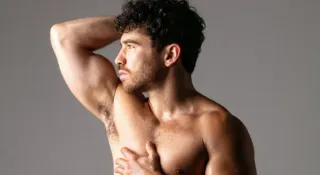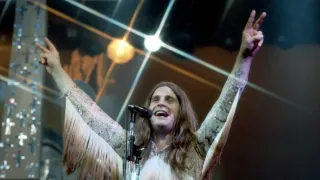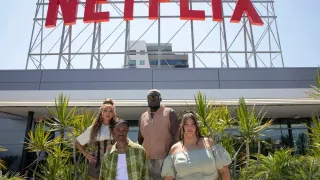July 5, 2014
Exclusive Interview with George Takei
Kilian Melloy READ TIME: 6 MIN.
George Takei knows what it's like to be celebrated as an actor, as a political activist, and as an Internet sensation. Whether he's recognized for his activism by GLAAD (this year he earned the Vito Russo Award) or by his fans, seven million of whom follow him on facebook, his life is rarely private - and always honorable.
He stars in his own documentary, called "To Be Takei," produced by Jennifer Kroot, which is making its debut on DirecTV Cinema on July 3, and will be available for viewing through August 5. The documentary's TV debut is in the run-up to a brick-and-mortar theatrical release later this summer.
I was honored to have a chance to talk to George Takei about the state of LGBT equality, about his documentary, and the upcoming Broadway debut of his musical, "Allegiance."
When I asked my friends and readers if they had any questions for you, most of them said, "Just tell him 'Thank you' for all he's done."
We're all pulling the same wagon here. All I'm doing is simply making my contribution. Isn't it amazing how far we've come in just a few short years?
You've personally come a long way since coming out to the world back in 2005.
It has been a dramatic, amazing, almost surreal experience. The State Department sent me on a two-week speaking tour through South Korea and Japan, and I ended up being honored at a reception hosted by the American ambassador to Japan, Caroline Kennedy. At that reception, one of the guests was the First Lady of Japan, the wife of Prime Minister Shinzo Abe, Mrs. Akie Abe. She told me that she had ridden on a float in Tokyo's Rainbow Pride just the week before. Can you believe that someone like the First Lady of Japan rode in the Pride Parade?
And then go back to 2005, when both houses of the California Legislature passed a landmark marriage equality bill. Massachusetts had marriage equality at that time, but it came through the courts...so for the first time, the legislature had legalized marriage equality, and the bill went to the desk of the governor, Arnold Schwarzenegger, and he vetoed it. When the press interviewed him, he kept saying in this robotic tone, 'I have no problem with marriage equality, but I vetoed it.' And later on we learn that, at that time, he was carrying on with his housekeeper under his wife Maria Shriver's nose!
To think, from that time to now, when I'm meeting the First Lady of Japan and I'm being honored at a reception by Caroline Kennedy, it's just surreal to see how much in my life has changed in just nine short years.
Recently, the Fort Lauderdale City Council approved a marriage equality resolution, but the mayor voted against it. How do you feel when you hear people voice their opposition to equality considering that's clearly the way the country is headed?
Right now there are 19 states and Washington D.C. where there's marriage equality, and a number of states have found their bans on gay marriage to be unconstitutional. There was a poll recently out in California that showed that 78% of people under the age of 40 were for LGBT equality - and this isn't just marriage equality, this is for equal LGBT rights across the board. I personally think we'll have marriage equality nationwide within the next two years. It's a matter of longevity. That [intolerant] generation will be dying out and then there will be the best chance for equality and for all of us to be united.
You were recently the Grand Marshal of the Pride Parade in Columbus, Ohio. Tell me about that experience. How did that come about?
Ohio is a battleground state. The Speaker of the House is from Ohio, specifically the Cincinnati area, which is a very conservative area. But Columbus, which is the capital of Ohio, is one of the most advanced parts of the state. There is an extraordinary individual who lives there.
Do you remember the last presidential election? There was a debate, and a young soldier videoed in his question to the candidates running for the Republican nomination. He was on the battlefield in Iraq, and he asked "If one of you should get elected President of the United States and become Commander-in-Chief of the military, would you reinstate 'Don't Ask, Don't Tell,' or would you let gays and lesbians continue to serve patriotically?' " And the Republican audience booed an American soldier fighting for this country in Iraq. It was shocking.
And the next thing that struck me while watching that on television was the silence from all of the candidates. It was very telling. And then, finally, Rick Santorum spoke up and he said, "The military is not a place for sex." How can he say that? The guys are always talking about sex. "Look at that hot babe there." They have pictures of near-nude women posted inside their locker doors. Sex is rampant in the military! And the humiliation and the bullying of LGBT soldiers was rampant during "Don't Ask, Don't Tell." People serving honorably could be humiliated and fired.
That young man who asked that question is from northern Ohio, and he wrote a book called "Soldier of Change," and I wrote a foreword to his book. His name is Stephen Snyder-Hill, and he was a previous grand marshal of the same parade. That was how I was invited to be the grand marshal of that pride parade.
I really had a high there. As far as the eye could see, which was more than three miles, there was a sea of people. I was told that Columbus's pride celebrations are the second-largest in the Midwest, the largest of course being Chicago. The press the next day said there were 460,000 people - almost half a million people there. It was a rainbow of diversity. There were all colors, all races, all backgrounds. I saw men holding hands, women holding a little child's hand, and even... a man holding a woman's hand! [laughs] It was what America should be. It was truly a pride parade.
Stephen and his husband Josh were the grand marshals of the parade last year and I invited them on to the float with me. So it was them, myself and my husband Brad up there. It was fantastic. It was a high on High Street. And then two blocks away from where we turned the corner, we passed Gay Street. [laughs] I thought it was very symbolic.
The largest pride parade we have here in Florida brings in between 125,000 and 150,000 people. We don't hold a candle to Columbus!
See? So don't you go looking down your nose at Columbus...it's a fantastic and very liberated city!
It sounds like it. So now, please tell us about your documentary. Whose idea was it to put your life and your husband's life on film in documentary format?
Jennifer Kroot, a documentarian, approached us. We didn't know her from Adam... or Eve! [laughs] We did a little research on her and we saw a documentary she made. We were very impressed with the commentary and its substance. I thought, "This would be a good way to let people know about our advocacy and the work we do." She put together a team, and I loved the team's diversity.
So they followed us around for the next three years. We have homes in Los Angeles and in New York City and they were there, and they also followed us on the trip we made to southeast Arkansas and the internment camp in which my family and I were incarcerated. There's a cemetery there, and it's the only evidence that a camp had even existed. At that cemetery there is a pylon that listed the names of the Japanese-American men who lost their lives fighting for their country in the Second World War. To think, going from one side of a barbed wire fence, being imprisoned by your own country, and then to fight for that country, and make the ultimate sacrifice - that's amazing to me.
They also followed me to San Diego where I premiered the musical, "Allegiance," based on my experiences during the War. I wanted to end the documentary with the play opening on Broadway, but we've been trying to find a home for it. Every theater is booked up, so we have to wait in line. I am confident that we'll find a theater for it by the end of the year.
Is there anything the fans can do to tell theater owners that we want to see "Allegiance," and soon?
As a matter of fact, there is. In San Diego we had a sold-out run. We had to turn people away, and eventually it meant we needed to extend our run. What we're doing now is allowing people to purchase priority access passes for $5, which gives you a download of the original cast album, and will allow you and another person to "get in line" and ensure that you will have a seat once ticket sales open up. Over 10,000 people have already purchased this priority access pass, which helps us when we negotiate with theater owners.
According to his recent Facebook post, Takei received the Frameline Award in San Francisco, where "To Be Takei" screened as the Centerpiece Documentary. He was honored "for his pioneering contributions to the representation of Asian American and LGBTQ figures in media."
For more information visit:
directv.com/technology/directv_cinema
tobetakei.com
allegiancemusical.com
https://www.youtube.com/user/TakeisTake
https://twitter.com/georgetakei
https://www.facebook.com/georgehtakei
http://www.pinterest.com/georgetakei/
http://www.allegiancemusical.com/blog-so-takei
Kilian Melloy serves as EDGE Media Network's Associate Arts Editor and Staff Contributor. His professional memberships include the National Lesbian & Gay Journalists Association, the Boston Online Film Critics Association, The Gay and Lesbian Entertainment Critics Association, and the Boston Theater Critics Association's Elliot Norton Awards Committee.
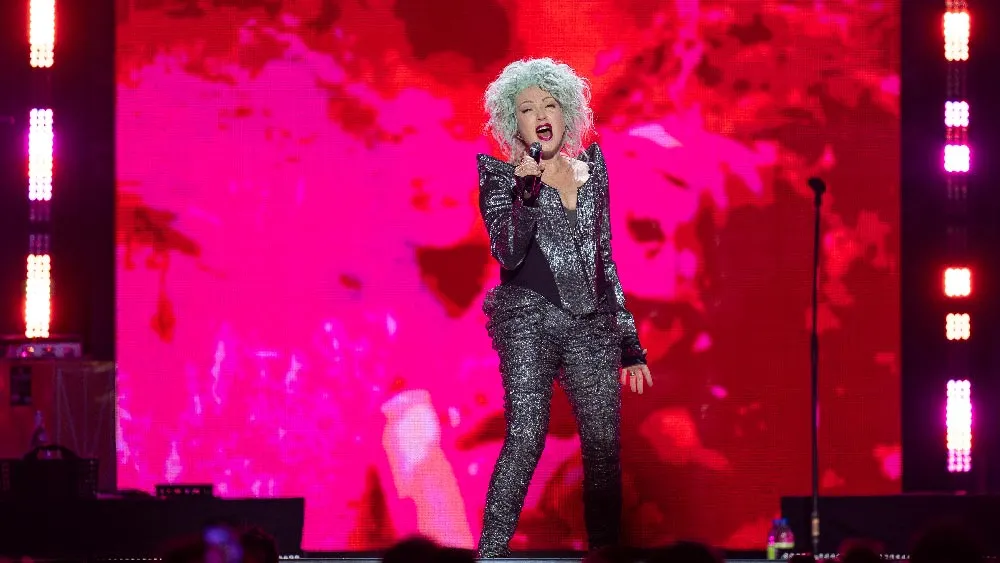
 Copyright HotSpots! Magazine. For more articles from HotSpots! visit
Copyright HotSpots! Magazine. For more articles from HotSpots! visit 
